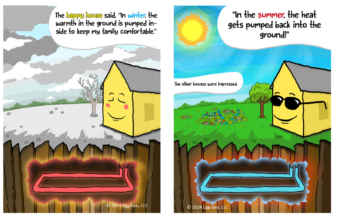 Dain Hansen is vice president of Government Relations, The IAPMO Group. He lends his frequent perspective of Capitol Hill, and the plumbing industry.
Dain Hansen is vice president of Government Relations, The IAPMO Group. He lends his frequent perspective of Capitol Hill, and the plumbing industry.
Here is an edited version of his update from December 11, 2015:
Congressional Update
This week: The House passed legislation to strengthen security measures in the federal government’s visa waiver program. The Senate passed a comprehensive education reform bill, which was signed into law by President Obama. The Senate also passed an extension of government funding through December 16.
Next week: Both the House and Senate will focus on finalizing a government funding bill through the end of the fiscal year (September 30) by next Wednesday (see below) as well as a tax extenders package (see below). The House may also vote on a “reconciliation” bill that would eliminate key parts of Obamacare, which will be vetoed by the President. After these votes, both chambers will recess for the holiday season until early January.
Financial Riders Stall. Efforts to put financial services riders on the omnibus government funding bill appear to be falling short. Bipartisan negotiations on financial regulatory relief, including a potential increase in the threshold at which banks are subject to enhanced requirements, broke off as moderate Democrats were unable to accede to the scope of changes Republicans were pushing. Meanwhile, a provision blocking or delaying the Department of Labor’s (DOL) fiduciary proposal remains a possibility, albeit an unlikely one at this point. After furor from the left over the inclusion of a swaps provision benefiting banks in last year’s funding bill, the Democratic leadership and White House are using the leverage they have to hold a tough line on most riders, including those of interest to the financial industry.
Government Shutdown in Play. December 11—is the day government funding for all agencies expires, though legislation extending that deadline through December 16 will be signed today. Lawmakers and President Obama have already agreed on the amount of money to be spent in the funding bill for this year ($1.1 trillion), but sharp disagreement remains over how to allocate that money and how it affects various regulatory and other executive actions. The ability for a longer-term bill to come together rests on how various “riders” will be resolved. Most Republicans want riders that will stop or curtail certain executive actions, while most Democrats will resist those riders. Beyond the financial services riders mentioned above, listed below are a handful of significant and contentious riders that will need to be resolved in a final deal.
Syrian Refugee Scrutiny. Should Syrian refugees be subject to more vetting than is typically required of refugees in general? Republicans say the national security threat warrants the higher scrutiny, while President Obama says the current vetting process is adequate. It remains to be seen whether a compromise will be reached on this rider or if it will be dropped in favor of reforms to the visa waiver program which nearly all lawmakers and President Obama support.
U.S. Crude Oil Export Ban. There will be an effort to lift the current ban, imposed in the 1970s during the Arab oil embargo. Many energy-state lawmakers (including some Democrats) support lifting the ban, but the Obama Administration views it as a potential obstacle to its climate change goals. Due to bipartisan interest in lifting the ban, this rider has a decent shot at succeeding.
Climate Change Regulations. Various pending regulations from the Environmental Protection Agency will be targeted for defeat or revision, and these will be fiercely resisted by the Obama Administration. Climate change will be a legacy issue for the outgoing President, and both he and his allies in Congress will fight hard to preserve these regulations. These provisions could be dropped in exchange for the adoption of the elimination of the U.S. crude oil export ban.
Obamacare Provision Repeal. Last year’s funding bill contained a rider to scale back Obamacare’s “risk corridor” provision, which extends federal subsidies to insurance companies that lose money as part of their participation in the law’s market exchanges. Democrats will push back any attempt by its sponsor, presidential candidate and Senator Marco Rubio (R-FL), to extend the rider.
The Bottom Line. President Obama has most of the leverage in these negotiations since Republicans are more likely to be blamed for any government shutdown if the talks drag on. Republican leaders will increasingly be under pressure to avoid the political blame that comes along with a shutdown as well as placating a restless base that wants a victory on at least a few of the riders. Republicans may succeed in getting a very small number of riders, but they won’t get many. Not surprisingly, the primary problem for Republicans is the Senate, where 60 votes will be needed to accept a bill with riders. That is a high hurdle to clear and will serve to limit any specific Republican gains in this bill.
House Committee Approves Data Security Legislation. The House Financial Services Committee this week approved a bill supported by the banking industry that would establish a national data security and breach notification standard to protect consumers’ financial data. The measure would direct any individual, corporation or nongovernmental entity that interacts with sensitive consumer financial or other nonpublic data to develop an information security plan to protect consumers’ personal information. Currently, data breach laws are comprised of a patchwork of state laws. While many industry stakeholders are constantly seeking ways to improve data security, they recognize that the system is only as strong as its weakest link. The Financial Services Roundtable said current laws already require financial institutions of all sizes to develop and maintain robust internal procedures to combat and address network intrusions and data theft, and to notify consumers in the event of a breach. Many other sectors are not subject to the same requirements, the industry group said. With the passage by the Financial Services Committee, the bill goes to the House Energy and Commerce Committee, where it was jointly referred.
Industry News
Sewage Treatment Plant Triggers “Lake Effect” Snow. It’s beginning to look like Christmas in Central Pennsylvania where it was reported this week that a thin layer of lake effect snow was generated by a relatively warm and moist sewage treatment plant. Lake effect snow forms when very cold air blows over a relatively warm body of water. The moisture from the lake evaporates into the air which rises to form clouds and eventually leads to snow downwind. Some of the biggest snow totals on record east of the Rockies are in lake effect snow zones. Apparently, it doesn’t take much to trigger the process, and it doesn’t matter what the body of water is. The Weather Service in State College described how “several tenths of an inch” of snow seemed to magically appear overnight finding that “additional moisture was added to the atmosphere by the natural condensation process of the local sewer treatment plant.” Don’t worry about eating yellow snow…the snow itself did not contain any sewage particles. When water evaporates, it leaves other chemicals and compounds behind.
High-Tech Roof Finished At New Vikings Stadium. Last week, contractors working on the Minnesota Vikings new stadium finished the high-tech plastic roof. The material they used looks like something from a household kitchen — a wobbly, paper-thin surface that could be used as a cutting board. It’s called an ETFE pneumatic roof, or ETFE for short. That stands for ethylene tetrafluoroethylene, a polymer similar to Teflon with the same nonstick qualities. It’s extremely durable and flexible, but still lightweight and translucent — qualities that make it ideal for what the Vikings want at U.S. Bank Stadium. The Metrodome’s fiberglass roof, where the Vikings used to play, infamously caved under the heft of deep snow in December 2010. That roof was held up mostly by air pressure. Air supports the ETFE pillows in the new roof, but those pillows also are girded by a steel roof structure. The underlying steel structure is self-supporting, so a loss of air pressure won’t cause the roof to sink like the Dome’s did. Stadium designers noted that the plastic has been used on sports arenas and buildings throughout the world, so it’s been tested in all sorts of weather and has proved extremely durable. The hard roof on the stadium’s north side is steeply pitched and will easily shed snow into a diverter and gutter system encircling the roof. The diverter captures the snow as it comes off the roof and channels it into the gutter, which has a radiant heating system to ensure melting.
Downton Abbey Inspired Plumbing Products? It’s not a subject any well-bred aristocratic gentlemen or lady would bring up in polite company – but Downton Abbey has inspired an official branded privy – and other plumbing products. Fans of the hit period drama will now be able to toilet like a Countess, thanks to a new merchandising deal. After Downton-branded mugs, aprons, jewelry, board games, wine and cushions, now it is the turn of bathrooms to try to cash in on the show’s popularity. The products are being sold by Liverpool-based Victorian Plumbing, which has bought the rights to use the logo of Downton Abbey just before the series comes to an end in the UK with a two-hour finale on Christmas Day. It signed a contract with NBC Universal. The value of the deal has not been disclosed but experts suggest it could be worth about $300,000. NBC Universal declined to comment, and Victorian Plumbing also refused to give details of the ‘confidential’ deal. Among the plumbing products launched this week is a Edwardian-style ceramic toilet with distinctive ‘DA’ monogram. Now there is a throne that is fit for a queen!




Join the conversation: